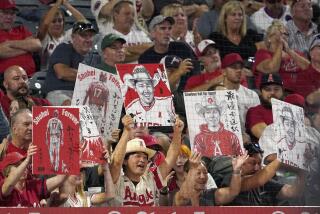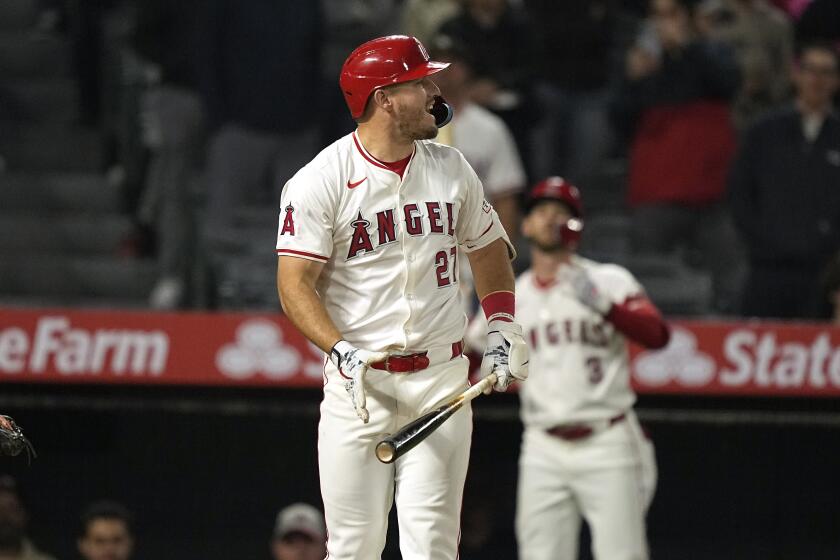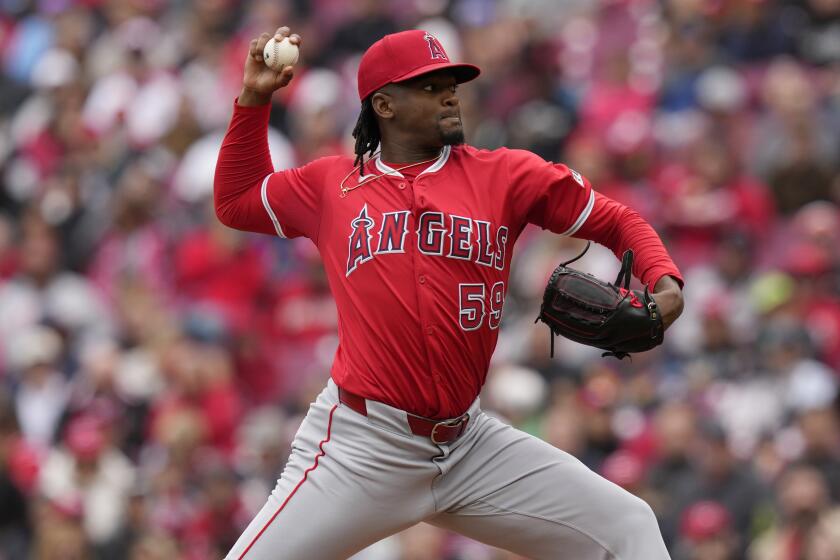Changing things up
The tipoff for Jered Weaver came on his third pitch of the game Monday night, a first-pitch fastball that Oakland’s Daric Barton grounded to first base for an out.
That leadoff batter Coco Crisp swung at Weaver’s first two pitches, producing a fly ball to right field, was no surprise. The A’s outfielder is a free swinger who through Thursday had one walk in 91 at-bats this season.
But Barton is one of baseball’s most patient hitters, a guy who entered the weekend having seen a major league-leading average of 4.66 pitches per plate appearance and had walked 18 times, fifth-most in baseball.
When he took a healthy hack at Weaver’s first pitch, it set off an alarm in Weaver’s head.
“Barton is not a guy who swings too early in the count -- he likes to take his walks and see a lot of pitches,” Weaver said. “When he came out swinging at the first pitch, I knew they were going to be aggressive, and they were pretty much that way the whole game.”
Weaver likes to get ahead in the count, often with well-placed fastballs, but after Barton’s at-bat, the Angels ace altered his game plan, using more off-speed pitches -- sliders, curveballs, changeups -- early in the count.
The result was a seven-hit shutout and a 5-0 victory in which the 28-year-old right-hander struck out 10, walked one, threw first-pitch strikes to 23 of 35 batters and prevented the A’s from making much solid contact.
In six games entering Sunday’s scheduled start in Tampa Bay, Weaver is 6-0 with a major league-leading 0.99 earned-run average and 49 strikeouts.
He has given up 26 hits in 452/3 innings and has held opponents to a .163 average.
Manager Mike Scioscia said Weaver isn’t doing anything drastically differently from what he did in 2010, when Weaver went 13-12 with a 3.01 ERA and a major league-leading 233 strikeouts but suffered from a lack of offensive and defensive support.
His repertoire is the same, though one scout said Weaver’s slider is a little tighter and his fastball has a little more zip, leaning closer to 93 mph than his usual 91-92 mph.
Weaver has the same deception, with his lanky 6-foot-7 frame, across-the-body delivery and late life on his fastball. His command is as it has always been -- excellent.
After refining his between-starts workout regimen, he settled on one that worked so well last season he has carried it into 2011. And his shoulder, which troubled him in 2007 and 2008, remains sound.
“To me, he’s throwing the same way he’s always thrown,” A’s second baseman Mark Ellis said. “I don’t see any difference at all.”
But if you’re wondering why Weaver has gone from one of the top right-handers in the game to the second coming of Bob Gibson this season, look at what happened after that Barton at-bat Monday.
The A’s, known for their patience and plate discipline, came out ambushing Weaver early in the count. Weaver responded by killing them softly with off-speed stuff.
Weaver knows what adjustments to make and when to make them. With experience -- this is the former Long Beach State star’s sixth major league season -- has come a better grasp of opposing hitters, of how teams approach him, and of how to execute a game plan.
“I don’t know if he’s recognizing things more, but his instincts are as good as they’ve ever been,” Angels pitching coach Mike Butcher said. “He’s maturing as a pitcher. He also has tremendous deception with the ability to throw four pitches for strikes in any count. It’s a nice combination to have.”
Weaver has always been comfortable in the spotlight, and he’s growing into his role as staff ace and team leader, but he tends to squirm a bit when he feels too much of the focus is on him.
“All the accolades are great,” he said Monday night, “but the team is the most important thing. It was great to get the win.”
Asked the following day why his ERA resembles that of a star high school softball pitcher, Weaver went into self-deprecating mode.
“Smoke and mirrors,” he said. “I’m a magician.”
Opponents often wonder what Weaver has up his sleeve.
“You look up at the scoreboard and see his fastball is 91 mph, and you can’t believe it,” said Ellis, who is five for 32 (.156) lifetime against Weaver. “It seems like it’s 95-96 mph. And he locates it really well.
“Whenever we play the Angels and we don’t see him, there are not too many guys in this clubhouse who are upset about it. He’s tough for us to face. He’s not a comfortable at-bat, for sure.”
Angels second baseman Howie Kendrick can empathize.
“It probably wouldn’t be any fun facing him,” Kendrick said. “He can throw every pitch for a strike. He’s got two sliders, one hard, one a little slower. He has that Bugs Bunny changeup. You know he throws a lot of strikes. The tough part is trying to figure out what he’s going to throw for a strike.”
Weaver doesn’t have an overpowering fastball by major league standards, which is why location is so huge for him.
“If you paint the black with the first pitch or last pitch, it makes all the difference in the world,” said Weaver, a first-round pick (12th overall) in the 2004 draft. “Any time you can locate and put your pitches where you want to, you’re going to have success.
“I try not to nitpick too much and to fill up the zone as much as possible. I try not to get too many deep counts. I try to get to 0-and-2 and 1-2 as quick as possible and get early-count outs.”
There is only one potential drawback for the Angels if Weaver continues to dominate as he did in April: The cost of doing business with him and his agent, Scott Boras, will go up.
Negotiations between the sides the last two winters failed to produce a long-term contract, and Weaver, who can become a free agent after the 2012 season, went through his first two years of arbitration on one-year deals, for $4.265 million in 2010 and $7.365 million this season.
It was thought a contract in the range of the five-year, $78-million deal Felix Hernandez signed with Seattle before 2010 would have locked up Weaver last winter.
But if Weaver is a top Cy Young Award candidate this season and follows it up with another superb 2012, he could be in line for a contract closer to the seven-year, $161-million deal CC Sabathia signed with the New York Yankees before 2009.
“I believe that could happen, absolutely,” Angels General Manager Tony Reagins said. “If any player performs, you have no problem paying for his performance. It’s the other way around, when a player doesn’t perform and you have to pay him, when it gets difficult.”
--
--
BEGIN TEXT OF INFOBOX
Jered Weaver sits at or near the top of baseball in several statistical categories:
ACE HIGH
ERA -- 0.99, 2ND
WINS -- 6, 1ST
STRIKEOUTS -- 49, 2ND
OPP. BA. -- .163, 2ND
INN. PITCHED -- 45.2, 3RD
--
Six up, six down
In the first month of the season, Angels starter Jered Weaver has taken on -- and taken down -- six opponents. How he fared against each:
*--* Date Opponent Result IP H R ER BB SO NP March 31 @ Kansas City Win, 4-2 6.1 2 0 0 2 6 107 April 5 @Tampa Bay Win, 5-3 6.2 3 1 1 3 6 112 April 10 Toronto Win, 3-1 7.2 4 1 1 4 15 125 April 15 @ Chicago Win, 4-3 7 4 3 2 0 4 104 April 20 @Texas Win, 4-1 9 6 1 1 0 8 119 April 25 Oakland Win, 5-0 9 7 0 0 1 10 114 Totals Record: 6-0 ERA: 0.99 45.2 26 6 5 10 49 113.5* *--*
*Average number of pitches per game
More to Read
Go beyond the scoreboard
Get the latest on L.A.'s teams in the daily Sports Report newsletter.
You may occasionally receive promotional content from the Los Angeles Times.






